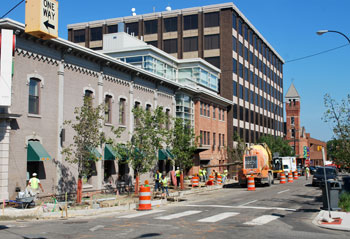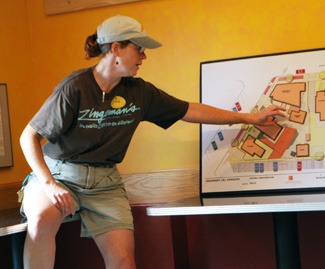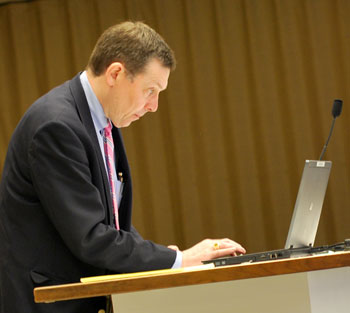DDA Board Retreat to Focus on City Talks
Ann Arbor Downtown Development Authority board meeting (Sept. 1, 2010): On its surface, the first regular meeting of the DDA board after its July election of new officers seemed to be a relatively uneventful gathering. Two topics that could have prompted extended deliberations were handled in short order.

Washington & Fifth Avenue, looking northwest. The concrete mixer is parked directly in front of the DDA offices. The entry for the board's Sept. 1 meeting was through the alley and the garage, which makes up part of the ground floor of the Fifth Avenue Building. (Photos by the writer.)
The first issue, handled with relatively little comment, was the report out from the DDA’s “mutually beneficial” committee, given by Roger Hewitt. The committee has been meeting over the course of the summer with a corresponding committee from the Ann Arbor city council to renegotiate the parking agreement under which the DDA manages the city’s parking system.
While board members Newcombe Clark and Russ Collins commented in a general way on the status of the conversations, it did not lead to any specific directive to the DDA’s committee for its next meeting, which will take place on Sept. 13 at 8:30 a.m.
However, at the suggestion of DDA executive director Susan Pollay, the board will schedule a retreat between now and its monthly board meeting in October – but likely after Sept. 13 – to focus on the “mutually beneficial” issue. In the meantime, the DDA’s committee will request of its city council counterparts that they provide their own assessment of the status of the negotiations. The Sept. 13 meeting of the two committees will also be the occasion when Pollay provides a detailed version of the outline, which she’d provided at the last committee meeting on Aug. 23, for a possible role for the DDA in the development of city-owned surface lots.
The second issue dispatched by the board with little overt controversy was a resolution that Newcombe Clark had brought through the operations committee last Wednesday to allocate $50,000 for support of skatepark facilities. Clark himself suggested that the resolution be tabled, alluding to the “prism through which everything is looked at this time of year.” DDA board members went along with that suggestion.
The prism to which Clark alluded is a political one. Clark is running an independent campaign for the Ward 5 city council seat currently held by Democrat Carsten Hohnke. Hohnke has positioned himself as a champion of the skating community’s efforts to construct a skateboarding facility at Veterans Memorial Park, which is in Ward 5.
At Wednesday’s meeting, the newest member of the board, former Washtenaw County administrator Bob Guenzel, and the member he replaced, Jennifer S. Hall, were acknowledged by chair Joan Lowenstein – but neither was present. The board passed a resolution of appreciation for Hall’s service, and Lowenstein welcomed Guenzel “in absentia.”
Other business at Wednesday’s meeting included the usual updates from the board’s committees. Notable from the transportation committee was an effort to collaborate with the Ann Arbor Transportation Authority to enhance bus service between Ann Arbor and Ypsilanti. And from the partnerships committee came a summary of a presentation they’d received from the chief of police – there’s a difference between being statistically safe and the perception of safety. [Full Story]





